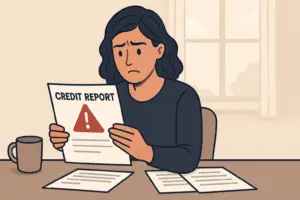Understanding Credit Report Errors and Their Impact
In the grand scheme of our financial universe, your credit report plays an essential role, influencing your ability to obtain loans, insurance, or even lease an apartment. It’s a sort of financial passport. Hence, its accuracy can’t be understated. Unfortunately, mistakes do happen. One such blunder that can dent your credit score considerably is an incorrect late payment. But these mistakes can be corrected to assure your financial creditworthiness.
If you are dealing with a credit report mistake, such as a falsely stated late payment, and the credit reporting agency refuses to take it off, contact us at Schlanger Law for a private consultation, We are here for you and advocate regularly on behalf of consumers inNew York, New Jersey and all over the country.. Call us now at (212) 500-6114.
How Common Are Mistakes on Credit Reports?
Errors on credit reports, such as mistaken late payments, aren’t one in a million. They happen quite often up due to various reasons – from sloppy bookkeeing by the creditor or its “loan servicer” to serious cases of identity theft. If left unattended, these inaccuracies can cause a damaging issue in your financial plans. So, it’s critical to keep a sharp eye on your credit reports and spring into action if you notice any mismatches as quickly as possible.
Your Rights under the Fair Credit Reporting Act
The Fair Credit Reporting Act (FCRA) of 1970 is a critically important tool when it comes to challenging discrepancies in your credit report. This law requires credit reporting agencies (CRAs) – the big three being Equifax, Experian, and TransUnion – to conduct a reasonable investigation when a consumer notifies them of a problem with his or her credit report.. Moreover, the FCRA outlines the roadmap for disputing credit report mistakes, which we’ll dive into below.
A Breakdown of Disputing Incorrect Late Payments
Start by Requesting and Reviewing Your Credit Reports: The FCRA grants you the right to a free copy of your credit report from each of the three major CRAs every 12 months through AnnualCreditReport.com. Thoroughly examine these reports for any inconsistencies, such as inaccurate late payments.
Take It Up with the Credit Bureau:
Spot an incorrect late payment? Reach out to the concerned CRA without delay. You’ll need to lodge a dispute, pointing out the mistake and backing it up with relevant documentation. We recommend that you do this IN WRITING, and by CERTIFIED MAIL.
Discuss It with the Creditor:
At the same time, get in touch with the creditor who reported the inaccurate late payment. Share the same information with them and ask for a correction. Again, do this IN WRITING and by CERTIFIED MAIL. If you have received a monthly statement, use the billing dispute address that is listed on your monthly statement.
Ensure Compliance and Follow-up:
After launching your dispute, make sure the CRA and the creditor follow the rules while managing your complaint. If your dispute gets brushed off or overlooked, you might need to take the situation to the next level with legal assistance in order to get the mistake on your credit report corrected and receive compensation for the harm you have suffered.
Bring in An Experienced Credit Reporting Attorney to Fix The Credit Report Issue if the Credit Reporting Agency Denies Your Dispute:
If your dispute hits a wall, think about hiring a lawyer who specializes in consumer protection law. They can steer you through the tricky dispute process and even aid in suing Experian, TransUnion, or Equifax if needed.
The Role of an Attorney in Resolving Credit Report Errors
Getting a well-respected consumer protection attorney on board can give a serious boost to your odds of successfully correcting an incorrect late payment on your credit report and receiving compensation for the harm that the creditor and credit agency’s mistake has caused you. Crediting reporting law is a specific, niche area of the law. A lawyer who brings a deep-rooted understanding of consumer protection statutes can better navigate the defenses that the creditor and credit agency are likely to raise.
Credit Report Mistake FAQs
How often do I need to review my credit reports?
Regularly reviewing your credit reports is crucial for catching errors early. It’s a good practice to check your credit reports at least once annually. We recommend once per month.
What happens after I lodge a dispute with a CRA?
After you lodge a dispute, the CRA must investigate the issue, usually within a 30-day timeframe. They’ll also give the creditor a heads-up about your dispute.
Can I sue Experianc, Transunion, or Equifax for reporting incorrect late payments?
Yes. If the CRA or creditor doesn’t correct the error post your dispute because they have failed to reasonably investigate your dispute, you’ve got the right to sue them with your lawyer’s assistance.
How does a late payment affect my credit score?
A late payment can put a serious dent in your credit score, particularly if it’s recent. The effect wanes over time, but a late payment can linger on your credit report for up to seven years.
What if I’m unable to afford a lawyer?
Schlanger Law Group LLP offers free initial consultations and regularly works on FCRA cases on a contingency basis, i.e., they’ll only get paid if you win.
If you are dealing with a credit report mistake, such as a falsely stated late payment, contact us at Schlanger Law Group, LLP for an initialconsultation, We are leaders in the field of fair credit reporting litigation and represent consumers in New York, New Jersey and nationwide. . Call us now at (212) 500-6114.







